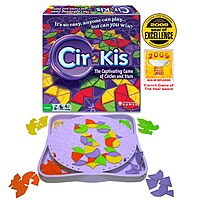CirKis
This article has multiple issues. Please help improve it or discuss these issues on the talk page. (Learn how and when to remove these messages)
|
 Product Display | |
| Designers | Phil E. Orbanes |
|---|---|
| Publishers | Winning Moves Games USA Winning Moves France Winning Moves Germany Winning Moves UK Hasbro |
| Players | 2 to 4 |
| Playing time | 15-25 minutes |
| Age range | 8 and up |
CirKis is a piece placing board game, for two to four players, invented by Phil E. Orbanes and developed by Winning Moves Games USA in 2008.[1] However, the game is no longer in production. The game is based on a Penrose tiling.
Gameplay
[edit]The game is played on a decagonal board, which contains the scoring pegs, and has a storage well for each of the four coloured sets of pieces. There are 80 total pieces divided into four identical sets of purple, red, green and yellow.[2]
The first player must place a piece inside, or touching, the center circle. Then, every piece played must touch the piece previously placed on the board. So, on a player's turn, they must place a piece so it touches the piece that was just played by the previous player.
Players score points by completing circles and stars. If a player has majority of the five segments in the circle or star, they scores 10 points. A five point bonus is awarded to the player who completes the shape if they do not have majority in the shape.
A player can earn a free turn – play anywhere, in three ways:[2]
- If they complete the centre star
- If they are the first player to use their silver piece
- If they place a piece that is completely surrounded and there is no adjacent spot for the other players to play.
Strategy
[edit]- Each player has the same exact pieces. There are large pieces that cover three segments of a circle. If a player has the chance to play these, they have immediate majority and will score 10 points when the shape is completed. There are no pieces covering three segments in a star.
- The smaller pieces like the arrow and wedge will come in very handy later in the game when trying to navigate out of tight spots.
- Free turns can be very valuable, but if the game results in a tie, the winner is the player with the greatest number of pieces remaining. This means that it took fewer moves for that player to reach 40 points.
References
[edit]- ^ "CirKis™ Origin". Winning Moves Games. Archived from the original on 2012-02-03. Retrieved 2021-08-21.
- ^ a b "CirKis" (PDF). Retrieved 9 January 2015.



